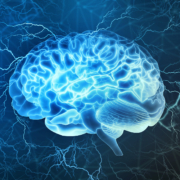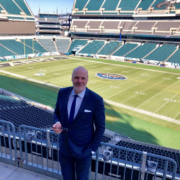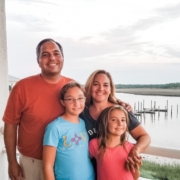Former coach piloting trial for Parkinson’s treatment
For more than 30 years, Billy Kennedy was revered as a brilliant coach and a charismatic leader on and off the basketball court.
Now, the former head coach of the Texas A&M Aggies men’s basketball team is being championed as the poster child for a new and potentially ground-breaking clinical trial aimed at stopping or reversing symptoms of Parkinson’s disease.
The study combines the established treatment for advanced Parkinson’s—an electrode-implanting surgery known as Deep Brain Stimulation, or DBS—with an experimental nerve-grafting procedure aimed at regenerating areas of the brain critical to Parkinson’s disease.
DBS involves implanting electrodes to deliver electrical impulses within areas of the brain to manage symptoms of Parkinson’s disease and other disorders. The amount of stimulation is controlled by a pacemaker-like device placed in the patient’s chest that can be adjusted based on that patient’s needs. In the new study, nerve cells are transplanted during DBS surgery, meaning patients do not have to undergo additional procedures.
This combined approach is called DBS-Plus.
Led by researchers at the University of Kentucky (UK) HealthCare Brain Restoration Center (BRC), the study began in February 2023 and is funded by the National Institutes of Health.
Coach Kennedy isn’t the only participant, but he is perhaps the most high-profile of the bunch. So far, he says the study has scaled back his Parkinson’s symptoms to the point where he feels he can manage the condition for the first time in his life.
“It’s been an awesome experience, and it definitely has helped slow down the progress of the disease,” said Kennedy, who also served as assistant coach of the Wichita State Shockers men’s hoops team. “I can do everything I did before the surgery. I don’t feel any pain. I haven’t lost any agility.”
Full-court press
Coach Kennedy’s journey with Parkinson’s began when he was 47, in 2011.
It was right after he took the head coaching job at Texas A&M – perhaps the biggest step in a career that started in 1987 and spanned multiple programs and decades. Within days of starting his new job, Coach Kennedy began to experience persistent soreness in his left shoulder. Someone recommended he see a neurologist. He was diagnosed with early-onset Parkinson’s shortly after that.
His initial reaction was panic. He read horror stories on the Internet. He couldn’t sleep. The more he stressed, the more severe the symptoms became.
“I got caught up seeing the worst of it, not knowing what the best could be,” he said.
Coach Kennedy’s attitude and point of view started changing gradually. He took a temporary leave of absence from the sidelines. He started taking medications—carbidopa levodopa—to address his symptoms. This worked for a while; so much so that he won Southeastern Conference Coach of the Year in 2016.
Coach Kennedy became assistant coach at Wichita State in 2019, and gradually his symptoms necessitated more medication. By 2022 he got to a point where he was taking so much medicine that he started experiencing a side effect called dyskinesia, a type of uncontrollable body movements.
“Having dyskinesia on the sidelines on national TV was not a good thing,” remembered the native of Metairie, Louisiana. “Thankfully, my wife was the only one who noticed it.”
It was around that time that a friend told Coach Kennedy about the clinical trial at UK. He spoke with Dr. Craig Van Horne, a neurosurgeon and co-director of the UK HealthCare Neurorestoration Center (NRC).
Dr. Van Horne told Coach Kennedy about the trial and how it could significantly improve his symptoms.
That’s when Coach Kennedy got involved with DBS-Plus.
How it works
DBS-Plus is a complicated process that involves traditional DBS treatment and a little something extra.
Parkinson’s disease occurs when cells in an area near the center of the brain—called the substantia nigra—begin to die away. This region produces a neurotransmitter called dopamine, which serves many functions in the brain, including movement. It is generally accepted that many people with Parkinson’s disease have lost 60 to 80 percent of these critical cells in the substantia nigra by the time symptoms of Parkinson’s appear.
In a nutshell, the DBS-Plus study hinges on transplanting peripheral nerve tissue into a chosen area of the motor system that uses dopamine heavily to regulate movement. These grafted cells are tested for their ability to release chemicals believed to regenerate dopamine-producing neurons.
The transplant itself is fascinating; surgeons (in this case, Dr. Van Horne and his colleagues) take a small piece of nerve tissue from the patient’s ankle and implant it in their brain. Because the tissue is from the patient’s own body, there are no concerns about rejection. What’s more, because the experimental treatment is applied during a procedure that was declared safe and effective by U.S. Food and Drug Administration decades ago, DBS-Plus is considered relatively safe with only minimal additional risk.
According to Dr. Van Horne, the study’s principal investigator, the clinical trial is promising because of its approach to regeneration.
That approach revolves around peripheral nerves, nerves that exist outside the brain and spinal cord. Van Horne said scientists have known since the 1800s that these nerves possess regenerative qualities that nerves in the brain and spinal cord do not. His team hopes to leverage those regenerative effects within the brain, potentially halting or reversing nerve damage caused by Parkinson’s.
“While the peripheral nervous system can repair itself, the central nervous system does not do a very good job of it,” said Dr. Van Horne. “So, the question is, can we tap into the ability of the peripheral nervous system’s response for repair? Can we bring that to the central nervous system?”
Dr. Van Horne continued: “With Parkinson’s disease, there’s no treatment to change the course of the illness because it’s a progressive disorder. Our concept for DBS-Plus is disease modification. Previously, all the other transplant models were looking at symptoms and not disease progression, and from that standpoint, that’s where we can say the DBS-Plus has its big advantage.”
Real-world impact
To test the effect of the graft, researchers turn off the DBS pulse generator and evaluate patient’s symptoms at a baseline level.
So far, like Coach Kennedy, most trial participants have reported improvements in symptoms marked by a decrease in scores on the Unified Parkinson’s Disease Rating Scale (UPDRS), the most widely used clinical rating scale for Parkinson’s. To this point DBS-Plus has been performed in a total of 83 patients, from across Kentucky and from as far away as Florida, Texas, California, and Canada. The research team has published multiple articles (like this one and this one) about their work.
“We’ve seen good outcomes from a safety and feasibility point of view,” said George Quintero, PhD, clinical trial manager and vice chair of research in neurosurgery at the University of Kentucky. “This doesn’t cure Parkinson’s, but the hope is that it will make having the disease more manageable.”
For Coach Kennedy, improvements in conjunction with DBS-Plus have been significant; he has been able to reduce his meds by 75 to 80 percent, and he has been feeling great.
This, in turn, has all but eliminated the dyskinesia.
At the same time, Coach Kennedy said certain aspects of the experience have humbled him and left him struggling with his new identity as a patient with a neurogenerative disorder.
One challenge has been his voice. While Coach Kennedy still has his inimitable southern drawl, a common symptom of Parkinson’s is diminished volume in one’s voice, and he has experienced this significantly. These struggles prevented him from speaking during live play in practices and games and forced him to pick when and where he could have one-on-one conversations with players or with other coaches.
Another challenge has been optics. When he agreed to participate in the trial, Coach Kennedy said he was worried that if the related brain surgery became public, it might hinder recruiting efforts and become costly to his job. He didn’t want to let down the players on the team. He didn’t want to let down the program.
“I thought it would be too much,” he said. “We kept it under wraps as long as possible.”
Eventually, Coach Kennedy chose to “come out” about his Parkinson’s and his participation in the DBS-Plus trial.
He did newspaper interviews. He did a short documentary for NBC. These endeavors have afforded him the opportunity to speak about the disease openly in a public forum and raise awareness about what it is, what happens in your brain if you have it, and how this clinical trial can help.
“The fact that I’ve been blessed to have success post-Parkinson’s can give people hope, and it gives me hope that I can continue to meet it head on,” he said. “DBS-Plus has been a huge relief.”
What’s next
Both Dr. Van Horne and Coach Kennedy continue to move forward with drive and passion.
There’s no question DBS-Plus is working for Coach Kennedy—every day he feels good is a testament to that.
At the same time, it’s still too early to determine if DBS-Plus can and will make a difference for patients on a long-term scale. Research into the benefits and the inner workings of the treatment are ongoing.
The UK team behind the study continues to methodically examine the efficacy of the procedure, with an eye to one day taking DBS-Plus into a multi-center, randomized, double-blind controlled trial.
Dr. Van Horne said he hopes DBS-Plus will eventually become the new standard of care for advanced Parkinson’s, improving quality of life for all people with Parkinson’s disease.
“I’d really like to see this through to its fullest potential,” he said.
Coach Kennedy, who has made six appearances in the annual men’s college basketball tournament over the course of his career, chose to leave Wichita State after the 2022-2023 season. Currently he is looking for work, with the hopes of concluding a career that has spanned four decades with a scouting gig for an NBA team.
“I’m still very connected to the game,” he said. “Really, it’s all I’ve ever known.”
In a recent Wichita Eagle story about his journey with Parkinson’s, Coach Kennedy told the Wichita Eagle how much coaching meant to him, and how much he’d like to be a coach again someday.
“This is all that I’ve ever done for a long time now,” he was quoted as saying. “If I can impact kids’ lives and try to help them get to where I got, I’ll do it. I was blessed with a lot of people pouring into me, and I made it because of the people who have been around me. So if I can have that kind of impact on someone else trying to make it, then that’s what continues to drive me.”
Coach Kennedy says that DBS-Plus has been invaluable to him as he continues to live well with Parkinson’s disease. Dr. Van Horne hopes that it will shape the stories of many more Parkinson’s patients to come. In that goal, everyone wins.
This article has been factchecked. For more about that process, click here.









